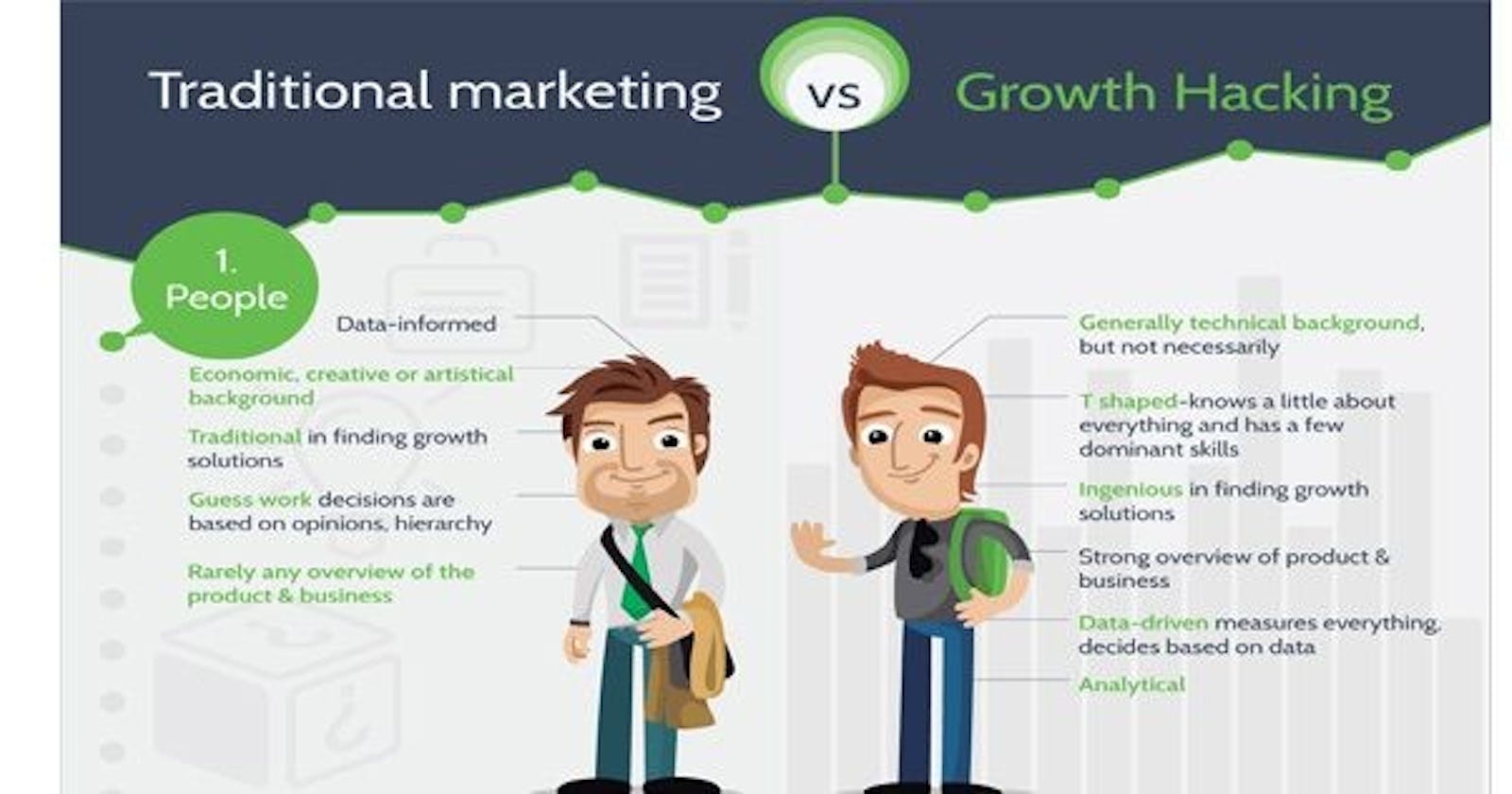What was the key for startups like Airbnb, Instagram, and other silicon valley names?
The answer is growth marketing
The beneficial but potentially disruptive influence of growth marketing is responsible for the rise of unicorns, and other business phenomena in which small companies were able to transform the landscape of entire industries.
Before the growth process can be mastered, there is a need to first understand some of its unique attributes as well as foundational concepts like
The fundamental elements of growth marketing
The mindset and orientation of a growth marketer
Process and implementation peculiarities of growth vs traditional marketing
Components of growth models and processes that are built from scratch
How to build and scale a growth team
Growth vs traditional marketing
The first major difference between growth and traditional marketing is in their focus areas along the length of the sales funnel
In traditional marketing, the focus areas are in the awareness and consideration stages of a customer journey, while the growth process targets the entire funnel.
The second major difference is that in brand marketing, the main drivers are campaign-centric while the growth process is driven by experimentation. These experiments are built along with features, offers, and messaging in order to generate the data required to continually optimize the funnel.
In many ways, the growth process was an offshoot of silicon valley's lean startup methodology. It begins by first admitting that we do not know what our customers want because any assumptions can lead to wasted time and resources. So it begins with establishing a series of hypotheses aimed at optimizing different stages of the funnel and then testing to either validate or disprove these ideas. From the test outcomes, the derived learnings are implemented in order to generate uplifts for the business.
The third main difference between growth and brand marketing would be best understood by imagining a starting point (current state of the business or product), a destination (objectives and key results), and two major paths (growth and traditional marketing) to reach that destination. In this scenario, the traditional marketing path would be about coming up with the best single campaign that's going to breach the position-to-destination gap in one go. And if you're right, you get a promotion and a raise. but if you're wrong, you don't get a second chance because you've put all your chips on the table with this one campaign.
The reality is that we are not right most of the time. So rather than investing in one single idea, it is better to take the growth approach which will involve running multiple campaign experiments in order to learn more about what will work in the future.
All these learnings, despite the inevitable failures that will accompany them, will lead to a self-reinforcing process that will improve the entire marketing operation over the long term.
Read: The Growth Marketing Process: Stop Looking For The Magic Pill
Experimentation as the defining trait of growth The experimentation process begins by first defining a goal, then designing a series of experiments in order to realize the goal and gather learnings along the way.
For example, you're a growth marketer at Jumia, and you are responsible for increasing retention rates from 50-60% in one quarter.
Traditional brand marketers probably wouldn't be focused on this metric, and their approach would be to run an email campaign to these users reminding them to use Jumia.
Each time they send an email, they'll monitor for retention or if there's an increase in traffic to the website. What won't be learned is whether or not the email is the right email, sent at the right time, contains the right message, and if it is actually responsible for any noticeable uplifts in retention rates.
What the growth marketer will do is to come up with a hypothesis like:
Hypothesis I: If people are reminded that Jumia is convenient, they'll return more often
The messaging in the emails maybe something like
"Save yourself an hour this week. Use Jumia instead of going to the grocery store."
Set it up as an A/B test, see if the people that receive the email actually buy more groceries or come back to the site more often than people that don't see the email. Then you learn whether the email actually increases retention or purchase rates of customers versus not getting the email at all.
Then if you learn that sending emails is a good idea, and actually increases purchases, you can then move on to the next hypothesis,
Hypothesis II: what is the right message to send people?
If sending emails is good, how can we send the best email that's going to lead to the most purchases and the most retention? So that's when you start testing messaging.
You say maybe it's about convenience and saving time or pricing.
Then you can learn whether a convenience emphasis works better than a pricing emphasis and so on. Potentially, you can go even a layer deeper and learn which customers exactly care more about pricing or convenience
Read: Common Growth Hacking Myths (and How Growth Actually Works)
What makes a successful growth marketer?
So there are three main components of a successful growth marketer and three things that people get evaluated on in terms of their growth marketing skillset.
1) Channel level expertise
So whether it's email marketing, Push notifications, SEO, Facebook ads, etc. An understanding of how a specific channel works and having some experience with the channel as an acquisition medium
2) Analytical capability
I think this is really important, whether it's just Excel, SQL skills, being able to extract data to gather insights, to analyze your own experiments is very important.
3) Strategic thinking & project management
It is about being able to come up with good ideas, picking the right experiments, prioritizing the roadmap, thinking about your customers' experience and the customer journey to identify big opportunities. It is also about working with other stakeholders due to the cross-functional nature of the growth process
**How to grow your career in growth
**
When you think about growing your career as a growth marketer, the two most important things to consider are;
a) what do you like and
b) What are you good at?
In the context of growth marketing, as we mentioned before, there are three different skill sets. There's the analytics, the channel-specific, and the strategy management, leadership type skills.
Figure out the ones that you enjoy most, and think about the ones that you're best at. Hopefully, they overlap. Be biased towards the one you like the most as long as you have the capacity to get better at it
Figure out what are your weaknesses, in the other two areas, and try to continue to develop those skills.
Start trying to forecast company needs 6, 8, 12 months down the line, then angle yourself to meet those needs once they are prioritized
Invest in getting better every single day. Regardless of where you want to go, if you want to move up, and you want to take on more responsibility, and have more impact; you have to invest in learning and getting better. So just challenge yourself, never accept that status quo, and apply the methodologies of growth to yourself. Try new things, optimize your process, obsess over being more productive and more effective.
Conclusion
Growth marketing is going to become more relevant as social media expands and alternate acquisition channels emerge. In adapting to the "growth decades" ahead, there would be need to develop a personal culture that mirrors the growth process and that's the key take away from this review.

